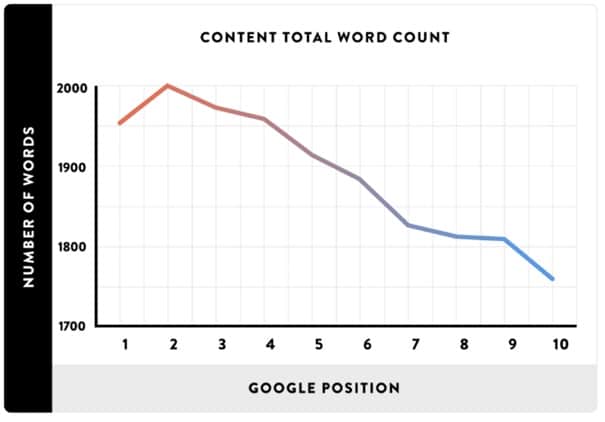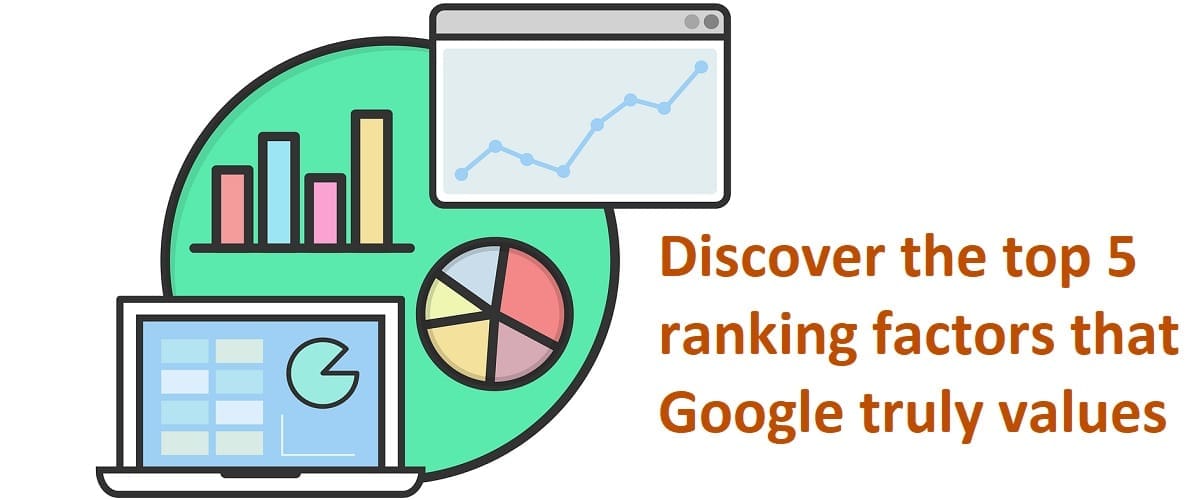Are you aware that Google uses many ranking factors to position websites? These ranking factors help Google determine how well your site’s content aligns with a user’s search query.
And let’s not forget, Google is the giant of the search engine world.
It leaves competitors like Bing and Yahoo in the dust with a staggering 8.5 billion searches every day. In fact, Google handles more than 90% of all internet searches.
This means that climbing higher on Google’s search results could be incredibly beneficial for your business. But with such a long list of factors, which ones should you prioritize?
In this piece, we’re going to zoom in on 5 key factors that can really boost your rankings. If there are any you haven’t tackled yet, it’s time to get moving.
Ready to jump in? Let’s get started…
What Are Google Ranking Factors?
A Google ranking factor is a bit of data that Google considers to figure out how effectively a webpage responds to a certain search question.
So, for instance, when someone searches for “best WordPress theme,” Google taps into these ranking factors to show the most helpful content for that person.
These factors range from the length of the content on a page to how quickly pictures pop up. Google’s aim is to deliver the best possible content that answers users’ searches and ensures they have a great experience on the web.
5 Most Important Google Ranking Factors
1. High-quality Content
“Content is king” reigns true when it comes to Google ranking factors, with content quality significantly affecting your position in search results.
To achieve higher rankings, create content that is unique, useful, and fresh. Google prioritizes quality, so no level of webpage optimization can compensate for poor content value.
Original, Unique, and Valuable Content
Google favors original content tailored to audience needs and providing unique insights. Avoid duplicating content; it can harm your SEO and even result in Google not indexing your pages. Duplicate content publication may also slow down Google’s crawl rate on your site. Ensure your content stands out from others targeting the same search terms and aligns with your focus keywords.
Up to Date and Fresh Content
Keep your content current to enhance quality. Google prefers recently published or updated information, especially for topics related to news or trends. Regular updates signal to search engines that your content is relevant. Use tools like Google Trends to find recent data and maintain content freshness.

Credit: monsterinsights.com
Content Length
Longer content typically ranks better, with top Google search posts averaging 1,890 words. However, the ideal length varies based on reader goals and subject matter. Quality content should be thorough, addressing user needs in detail, as Google rewards comprehensive information.
Content Structure and Organization
Well-structured blog posts improve readability and user engagement, influencing Google rankings favorably. Use headings, subheadings, and lists to organize content clearly, potentially earning featured snippets placement for relevant searches.
2. Page Experience
When the Search Liaison team clarified the removal of page experience from Google’s ranking systems page, they stated: “…Google’s core ranking systems look to reward content that provides a good page experience.”
Page experience was introduced in 2021, with Core Web Vitals (CWVs) being key. CWVs were then included in the broader ‘signals’ for page experience, maintaining its status as a ranking factor under the Page Experience umbrella.
This matters because Google aims to ensure a positive user experience by avoiding slow-loading pages, device incompatibility, and intrusive ads.
Google emphasizes the importance of page experience for content ranking, considering signals like HTTPS, Page Speed, Mobile Friendliness, and Core Web Vitals. However, it’s not always a decisive factor in ranking, especially when content quality is equivalent among competing pages.
John Mueller notes that Page Experience can help Google discern which pages offer better user experiences in such cases.
Improving these aspects aligns with Google’s goal of providing the best user experience, underscoring its significance in SEO strategies.
3. A Secure and Accessible Website
It’s no shocker that the top item on our SEO checklist involves using a URL that’s easy for search engines to understand. Essentially, you want a URL that Google’s bots can effortlessly find and scan.
Put simply, for Google to get the gist of your page, it needs to be able to drop by the URL and review the content. To give the crawlers a hand, make sure you’ve got:
- A site built with a solid website builder that’s up to coding snuff.
- A robots.txt file that guides Google on where it can (and can’t) dig around for info on your site.
- A sitemap that displays all the pages you have.
4. Page Speed (Including Mobile Page Speed)
For a long time now, how quickly a page loads has been a top factor for SEO rankings. Google aims to enhance the online experience for everyone, and speedy web pages are the way to go.
Back in July 2018, Google rolled out an update to its search engine algorithm that puts a spotlight on mobile page speed. If your website is slow to load on smartphones, it might take a hit in the rankings.
Why not give Google’s mobile testing tool a whirl to see where your site stands?
And hey, if you haven’t yet, it’s a smart move to get familiar with Google Search Console. It offers a special section all about your website’s performance, including its loading speed.
5. Links (Backlinks, Outbound and Internal)
The internet thrives on links between pages. This is why links are super important for SEO rankings. Here’s a trio of link types to consider:
- Links within your site connecting different pages (Internal).
- Links going out from your site (Outbound)
- Links coming into your site (Inbound).
Internal Links
Linking your own content helps Google and visitors by interconnecting pages, enhancing their value. An authoritative page can share its authority with another through linking, improving its search engine position. Create a network of internal links in new content, always using descriptive anchor text for clarity.
Outbound Links
Including outbound links to reputable, high-authority sites in your field is part of producing quality content. But this doesn’t mean you should overload your content with such links. Only use reliable sources with high domain authority, which is also beneficial for your users.
Inbound Links
Google utilizes inbound links to gauge the authority and relevance of your content.
Ideally, a reputable site should link to your content within their own. For instance, a link from the Content Marketing Institute is more valuable than one from an obscure, low-quality website.
Commonly known as “backlinks,” strive for numerous links from authoritative websites while minimizing links from inferior domains.
When it comes to inbound links, hiring an expert such as Outreach Bee is important. Our team has expert members in every aspect of SEO: from finding high quality websites for manual link building to writing great articles for your outreach campaign. If you have any questions, contact us now.



What Is Link Bait? A Complete Guide with Examples and Ideas
AI Search is Changing SEO: How to Optimize for AI Answers